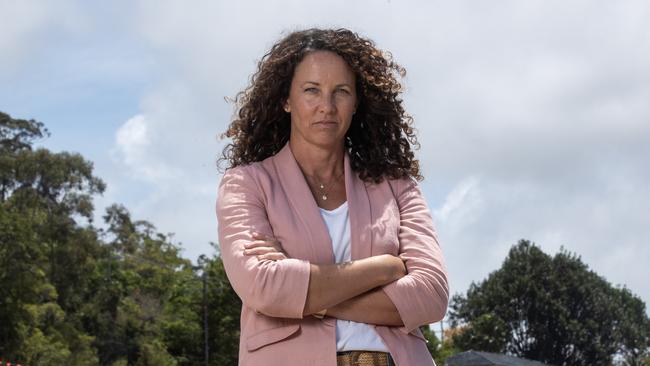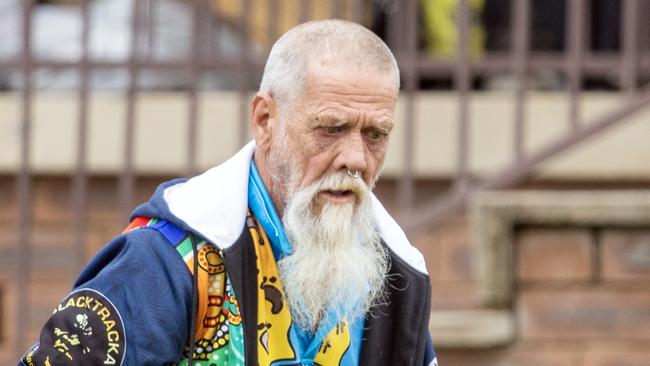Death threat inaction ‘due to the Indigenous voice referendum’
NSW government officials refused to sack an Indigenous adviser over his threat to kill a female colleague because it might cause tensions in the middle of the voice referendum campaign.

NSW government officials refused to sack an Indigenous contractor who made a death threat against senior executive Rochelle Hicks because they feared a strong response might “inflame” tensions in the lead-up to the voice referendum.
In a growing embarrassment for the Minns Labor government, newly released documents reveal that senior officials on the $2.2bn Coffs Harbour Bypass project were worried that removing cultural heritage manager Ian Brown in the middle of the voice campaign risked “politicising” the unfolding crisis.
The documents also reveal that another female Transport for NSW executive believed she was being “punished” for reporting Mr Brown’s threat to kill Ms Hicks and had been directed not to report the incident to police.
Senior manager Tammy Hosking was fearful of Mr Brown but felt compelled to attend a project “walkover” at which he was present, despite Ms Hicks’ plea that he be banned from the event.
Ms Hosking expressed her concerns in an email to a TfNSW official assigned to review the case after The Australian revealed last year that Mr Brown was allowed to stay in his contracted role “because he is Aboriginal and a cultural knowledge holder”.
Ms Hosking says that “even though … I personally felt unsafe, it had already been determined that the walkover would go ahead.
“If direct threats towards Rochelle were dealt with in the way they had been (dismissed), I was certainly not going to stand up and say ‘I felt unsafe’. This is why I asked (a male colleague) to attend the walkover, as I felt safer in his presence.”
Ms Hosking says that after the story was published in The Australian, a senior department official declined a meeting with her and told her not to engage with the Aboriginal community.
Her shared diary access permissions were revoked. “This has left me feeling disappointed and as though I am being punished for reporting this event,” she wrote.
On Thursday, The Australian revealed that after Mr Brown threatened to kill Ms Hicks, TfNSW officials tried to have her removed from her job instead of sacking him.
The heavily redacted tranche of documents released to parliament reveal that officials at TfNSW were desperate to placate the Coffs Harbour Local Aboriginal Land Council, which employed Mr Brown and had claimed “racist” conduct by the Bypass Project.
Ms Hicks, the deputy project director for the bypass project, had pushed back against using a mechanical sieve to retrieve Aboriginal cultural artefacts – a method opposed by NSW Heritage archaeologists as scientifically unsound.
A Transport official writes in a note of a meeting that the LALC claimed “the mechanical sieve issue borders on racism”.
When Ms Hicks’ decision to refuse use of the sieve was relayed to the Land Council at the meeting on June 21, Mr Brown said: “If I see Rochelle I will kill her”, adding it was “not a threat, it’s a fact”.
Ms Hosking reported that Mr Brown made the same death threat to project archaeologist Matthew Kelleher, who also was not present. Last year, Ms Hicks told The Australian that Mr Brown and others from the Land Council had frequently claimed racist conduct by the bypass project team.
In meetings she was often confronted with a tirade of foul language from Mr Brown, including him calling her a “white c..t”.
“He yelled at meetings and they were always talking about sovereignty – ‘We’re not going to accept what’s happening’ – and very righteous and very vocal, and often confused about what we’re trying to do on the project with these blanket statements about impacting on Aboriginal heritage,” Ms Hicks said.

TfNSW has failed to answer a series of questions from The Australian about the incident, including whether senior TfNSW executive Peter McNally acknowledged to Ms Hicks that they accepted Mr Brown’s violent behaviour because he was Aboriginal.
Ms Hicks said Mr McNally told her that reporting Mr Brown to police was not the answer because “to have the police rock up at his door would only piss off the Aboriginal community and they would go political on the project”.
The newly released documents show Ms Hicks’ account was accurate.
In an email to his bosses following his conversation with Ms Hicks, Mr McNally says: “I explained that it was in part given their connection to the site and Ian Brown’s role with elders but that we still had to demonstrate fairness before taking any action.
“I also advised that as we’re in the middle of a national campaign with the voice the actions proposed could politicise the incident, further inflaming and preventing resolution.”
When professional psychological support was finally organised by TfNSW, it wasn’t for Rochelle Hicks – it was for project officials who might have been disturbed by The Australian’s report in November and were offered an onsite debrief by a psychologist and a dedicated psychologist telephone support service.
The documents don’t reveal whether the offer was taken up.



